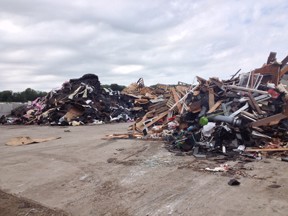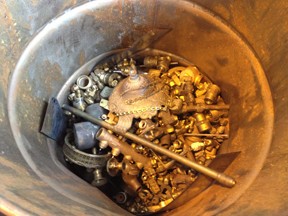Little Hoppers Now Recycles Construction and Demolition Material
- Share
- Tweet
- Pin
- Share
Construction and demolition projects don’t just put up and take down buildings. They also create waste.
But the wood, vinyl siding and broken slabs of concrete that used to be generated by local construction and demolition jobs don’t have to go to the landfill. Little Hoppers, a garbage and recycling company in Sturgeon Bay, now recycles that material.
“Basically what we’re trying to accomplish here is a one-stop environmental shop,” said Steve Estes, who co-owns Little Hoppers with his wife Tammy. “If anyone has any question on getting rid of anything, we want to be called.”

Separated piles of construction and demolition materials at Little Hoppers. Photo by Carol Thompson.
Little Hoppers now recycles construction and demolition materials for all their customers.
It all started with customers asking if their contractors were “green,” Estes said. People wanted to know what happened to the tiles ripped out of their bathrooms, and those contractors started asking Estes where the waste went.
Back in the early days, his answer was “the landfill.” Now that environmental concerns have become mainstream and the demand for recycled material keeps growing, the answer has changed. Construction and demolition waste is now collected in a big dumpster, sent to a sorting plant in Appleton and brought back to Sturgeon Bay before it’s shipped out to recycling plants.
“I think recycling’s the way the future’s going,” Estes said. “There’s a demand for it.”
Customers who wanted to recycle their construction and demolition debris used to have to separate it, but now Little Hoppers uses a single-stream system.
“Before we used to have put a box on the site for companies that wanted to be green up here,” Estes said. “One dumpster for paper, one dumpster for garbage, one dumpster for concrete. Everything had to be separated. Now everything goes in one bin.”

Little Hoppers pays for brass, one of the most valuable metals it collects. Photo by Carol Thompson.
Estes said one Little Hoppers customer stands out with its changing recycling habits. WireTech Fabricators, Inc., went from filling an 8-yard dumpster with garbage every week to just a 2-yard dumpster, and recycling pretty much everything but plastic gloves and paper towels.
“They’ve done a phenomenal job,” Estes said. “They’re that technical. They’re getting down to every little detail.”
WireTech Fabricators recently became a Green Tier company, meaning it exceeds environmental requirements set by the Wisconsin Department of Natural Resources. Since the company started focusing on its environmental footprint about a year ago, WireTech has more than doubled the amount of material it recycled. It went from producing 37 cubic yards of trash every month – almost enough to fill two and a half dump trucks – to just 17.
“It’s the right thing for us to do as an organization in Door County,” said plant manager Bob Wirth. “We owe it to our technicians, our associates, and we owe it to the community. It’s our way of paying back.”
WireTech has also installed lights that turn off when nobody’s working in an area of the plant, cut back on its use of paper products in the cafeteria and plans to install a sign in the parking lot telling truck drivers to turn off their engines while they’re parked.
Both Wirth and Estes plan to continue looking at more ways to recycle, and Estes said spreading the word about recycling options is a good way to expand what Little Hoppers already does. He even sometimes stops by farmhouses with big, metal pieces of equipment sitting unused on the property to tell people about the rates he offers for recycled metals – currently about $2.25 per pound of brass and $3 per pound of copper.
“From bikes to farm equipment to cars,” Estes said. “You name it – if it’s metal it gets recycled.”

